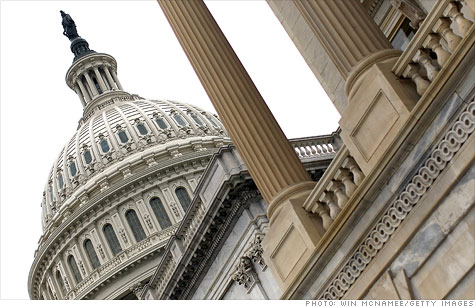Search News

When Congress gets around to corporate tax reform, simply cutting tax loopholes won't be sufficient to pay for the big reduction in the top corporate rate that everyone wants.
NEW YORK (CNNMoney) -- It sounds great.
Lower the top corporate tax rate of 35% and make up for the lost federal revenue by reducing the number of business tax breaks -- especially those much maligned and ill-defined "loopholes" carved out by corporate lobbyists.
The Republicans advocate for it. And now the White House is proposing it.
There's just one small problem. If you want to lower the top rate to 25%, as House Republicans want, or 28%, as President Obama wants, you can't pay for it simply by cutting some business tax breaks, or even "dozens" as the president recommends.
"A lot of people in this town are playing a shell game," said Eric Toder, co--director of the Tax Policy Center.
Indeed, to reduce the top rate of 35% to 28% in a way that is "revenue neutral" -- meaning it doesn't add to the deficit -- would require eliminating all major business tax credits and deductions, according to an analysis by the Joint Committee on Taxation. And the JCT said even then it would not necessarily stay revenue neutral after the first 10 years.
Another analysis by the Congressional Research Service estimates that eliminating all corporate tax breaks would only let lawmakers reduce the top corporate rate by 5.6 percentage points -- in other words, to 29.4%.
Either way, it's politically unrealistic to assume that anyone in Washington would ever agree to eliminate all business tax breaks, Toder said.
Partly that's because there are some breaks that most people agree do encourage investment and innovation and therefore are good for the economy.
Those include the two the most popular corporate breaks -- the credit companies get for money spent on research and experimentation and a deduction that lets them depreciate their capital investments more quickly.
Remove those two from the list of what can be eliminated and "getting rates down to 28% becomes a dream," wrote Howard Gleckman, editor of the TaxVox blog.
And even more so if one considers the costs of transitioning to a new corporate code.
That's why if Congress ever does lower the corporate tax rate below 30%, it likely would pay for it partly by curbing some business tax breaks but also by raising revenue elsewhere, such as raising taxes on individuals.
Policymakers just may not highlight that portion of their plan when selling it to the public. ![]()
| Overnight Avg Rate | Latest | Change | Last Week |
|---|---|---|---|
| 30 yr fixed | 3.80% | 3.88% | |
| 15 yr fixed | 3.20% | 3.23% | |
| 5/1 ARM | 3.84% | 3.88% | |
| 30 yr refi | 3.82% | 3.93% | |
| 15 yr refi | 3.20% | 3.23% |
Today's featured rates:
| Latest Report | Next Update |
|---|---|
| Home prices | Aug 28 |
| Consumer confidence | Aug 28 |
| GDP | Aug 29 |
| Manufacturing (ISM) | Sept 4 |
| Jobs | Sept 7 |
| Inflation (CPI) | Sept 14 |
| Retail sales | Sept 14 |